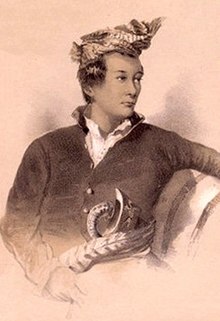| Ali Iskandar Shah | |||||
|---|---|---|---|---|---|
 | |||||
| Sultan of Johor | |||||
| Reign | 1835–1855 | ||||
| Predecessor | Hussein Shah I | ||||
| Successor | Abu Bakar | ||||
| Sultan of Muar | |||||
| Reign | 1855–1877 | ||||
| Born | 1824 Singapore, Straits Settlements | ||||
| Died | 21 June 1877 (aged 52–53)[1] Umbai, Malacca, British Malaya | ||||
| Burial | |||||
| Spouse | 1. Tengku Ngah 2. Daeng Siti 3. Cik Serimbuk | ||||
| Issue | 1. Sultan Allauddin Alam Shah 2. Tengku Mahmud Putra 3. Tengku Mansur Putra 4. Tengku Abdullah 5. Tengku Puteh 6. Tengku Sulong 7. Tengku Sambak 8. Tengku Cik Fatima 9. Tengku Mariam 10. Tengku Sharifah [2] | ||||
| |||||
| House | Bendahara dynasty | ||||
| Father | Sultan Hussein Shah | ||||
| Mother | Tengku Perbu[4] | ||||
| Religion | Sunni Islam | ||||
Sultan Ali Iskandar Shah I ibni almarhum Sultan Ahmad Hussein Muazzam Shah I[5] (Malay: سلطان علي اسکندر شاه اول ابن المرحوم سلطان احمد حسين معظم شاه اول) was the 20th Sultan of Johor,[6] who succeeded his father, Sultan Hussein Shah after the latter died of natural causes in 1835. Over the next twenty years, Sultan Ali's claim to being the Sultan of Johor were only recognised by some merchants and a few Malays. Like his father, Sultan Ali was a puppet monarch and played a minimal role in the administrative affairs of the state, which came under the charge of the Temenggong and the British. In 1855, Sultan Ali ceded the sovereignty rights of Johor (except Kesang in Muar) to Temenggong Daeng Ibrahim,[7] in exchange for formal recognition as the "Sultan of Johor" by the British and a monthly allowance. Following the secession of Johor, Sultan Ali was granted administrative charge over Muar until his death in 1877, and in most administrative matters, was often styled as the "Sultan of Muar".[8]
- ^ Winstedt, A History of Johore (1365–1941), p. 128
- ^ Ghazali, Istana dan politik Johor, 1835-1885, p.70
- ^ In Islamic cultures, the title Al-Marhum means "to one whom mercy has been shown. This is used for Muslim rulers who are deceased. Islamic Names: An Introduction, Schimmel, p. 59
- ^ Ali, Hooker, Andaya, The Precious Gift: Tuhfat Al-nafis, pp. 394, 411
- ^ Journal of the Malaysian Branch of the Royal Asiatic Society (1937), p. 93
- ^ Sejarah Kesultanan Negeri Johor[permanent dead link], Laman Web Rasmi Pejabat Daerah Kota Tinggi (Official Web Portal of Kota tinggi district), retrieved 12 March 2009
- ^ The Numismatic Circular (1970), pp. 47, 87
- ^ Burns, Wilkinson, Papers on Malay Subjects, p.72 In the end they signed the treaty of AD 1855. They gave Tengku Ali the district of Muar to govern as Sultan of Muar; and they agreed to pay him and his...